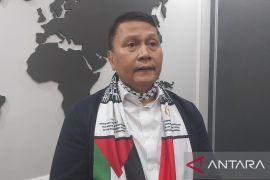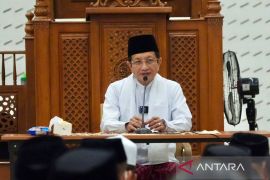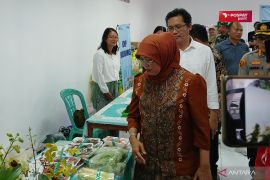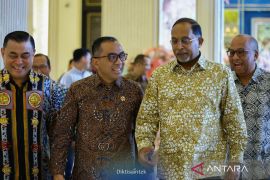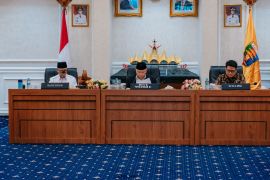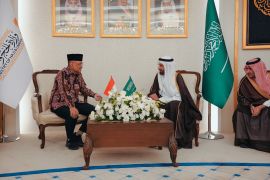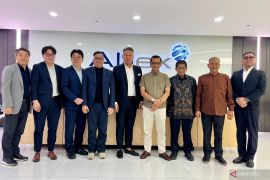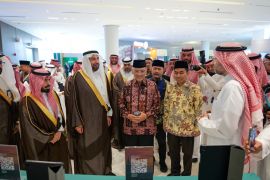"For the first time PUIC discussed a topic on the roles of women and their contribution to PUIC," Indonesia`s House Speaker Marzuki Alie, concurrently the PUIC president 2012-2013, said in Palembang, Tuesday (Jan 31) at the closing ceremony of the Seventh Conference of PUIC, which started on January 24.
The conference issued a Palembang Declaration, a final communique and a number of resolutions on political, economic and social-cultural issues.
Marzuki said the Palembang Declaration contained the views, stance and commitment of the PUIC member states on challenges facing the Islamic world, including about the promotion of democracy, peace, justice, and the improvement of Muslims` welfare.
The PUIC Standing Specialized Committee on Women, Social and Cultural Affairs in its session recommended sustainable and constructive dialogs between Islamic countries` legislators and their partners in the Western nations.
Headed by Indonesian legislator Nurhayati Assegaf, the Committee also emphasized the need to intensify the roles of women in various development aspects, to protect and improve the welfare of children, and preserve and protect Islamic historical and cultures sites, particularly the Al-Aqsa mosque in Jerusalem, Palestine.
Israel has been conducting "archeological activities" aimed at destroying Al-Aqsa mosque, which is one of Islam`s three most sacred places in addition to Kaaba in Mecca and the Prophet`s Nabawi mosque in Madina, Saudi Arabia.
On the sidelines of the PUIC conference, the First Muslim Female Legislator Conference was organized on January 27 at the initiative of Indonesia, to discuss efforts to empower and promote the roles of women in the OIC member states. The Conference issued a Declaration of Muslim Women Parliamentarians of the PUIC.
The Standing Specialized Committee on Political and Economic in the two-day session discussed among other things the impact of the global financial crisis and encouraged economic and trade cooperation among member nations of the Organization of Islamic Cooperation (OIC).
In the Standing Specialized Committee on Legal Affairs, Human Rights, and Environment session, law makers agreed to include universal values of democracy and human rights which are in line with the Islamic teachings, in the education curricula of the OIC member states.
They also emphasized the importance of the environmental preservation and the protection of migrant workers. The migrant worker protection is a very relevant issue for PUIC because some of its member states such as Saudi Arabia, Malaysia, Kuwait, and the United Arab Emirates are recipients of migrant workers from fellow member countries like Indonesia, Egypt, Afghanistan and Bangladesh.
The Palembang Declaration also said a new commission would be set up within the scope of a solution to the Palestine issue.
PUIC Secretary General Mahmud Erol Kilic in his speech urged Muslim-majority nations to consistently support Palestine and to be united in the face of Israeli tyranny.
"We must be united to face Israel, stop the expansion of Jewish settlements , and end the blockade of the Gaza Strip," Mahmud said.
PUIC fully supported Palestine as a sovereign country that could play active roles as a member of the United Nations, after being accepted as a full member of UNESCO earlier, he said.
Islamic nations wanted to live in a zone that was free from weapons of mass destruction, therefore, the UN must order Israel to abide by its resolutions concerning nuclear armament, he stated.
"We emphasize the rights of each state to develop nuclear energy for peaceful purposes, and to fight against terrorism committed by a country or sectarian Muslims," he said.
Marzuki Alie earlier said PUIC must take a resolute stance against various crimes committed by Israel, including the arrest of Palestine`s House Speaker Dr Aziz Dweik.
"PUIC must mobilize support for the releases of leaders and members of the Palestinian parliament from Israeli prisons and strongly condemn the (Israeli) crimes," he said said.
Democracy was given special attention by President Susilo Bambang Yudhoyono in his speech before the Muslim legislators. He said the ongoing events around the world serve as reminders not only of the changing world, but of the need to adapt to the forces that are sweeping the 21st century.
"The world in the 21st century is a world marked by connectivity and openness. It is a world marked by power shifts, not only horizontally between states but also vertically from governments to networks - of organizations, corporations and individuals. As such, we can well anticipate the continued change of political, economic and social landscapes which we are already seeing. If these changes are not matched by greater reforms, then we may see yet another shocks and turbulence," he said in Palembang, on January 30.
He cited as an example that the world was bound to see greater demands for the people`s voices to be heard, and for greater popular participation in governance.
With the advent of technology and globalization, the people are expressing greater demands for a better standard of living, a greater share of the economic pie, he said.
"Many people in the Muslim world are realizing what they have missed: freedom of expression, participation in governance, and essential social services," he said.
The president said Indonesia had evolved to be a country where Islam, democracy and modernity could thrive together.
"Our democracy, while imbued with universal values, is essentially homegrown. The core values of Islam and those of our diverse cultures have been harnessed to support our democracy," he said.
In a similar manner, Indonesia sought to harness the core values of Islam and democracy to address some of the pressing issues affecting all Muslims, he stated.
Finally, in the 14th Session of The PUIC General Committee (Council) held as part of the Palembang conference, the Council decided to accept the Parliament of Maldives as the 52nd member of PUIC, and to give the status of observer to the Parliaments of Belarus, Russia, Moro National Liberation Front (MNLF) and the Statistical, Economic and Social Research and Training Centre for Islamic Countries, a body under OIC.
Established in 1999, PUIC`s 52 member countries include Afghanistan, Algeria, Azerbaijan, Bahrain, Bangladesh, Benin, Burkina Faso, Cameroon, Chad, Gabon, Indonesia, Iran, Iraq, Jordan, Kuwait, Kyrgyzstan , Lebanon, Libya, Malaysia, Mali, Mauritania, Morocco, Mozambique, Nigeria, Oman, Pakistan, Palestine, Qatar, Saudi Arabia, Senegal, Somalia, Sudan, Syria, Togo, Tunisia, Turkey, United Arab Emirates, and Maldives as the latest member. (*)
Reporter: By Fardah
Editor: Kunto Wibisono
Copyright © ANTARA 2012
